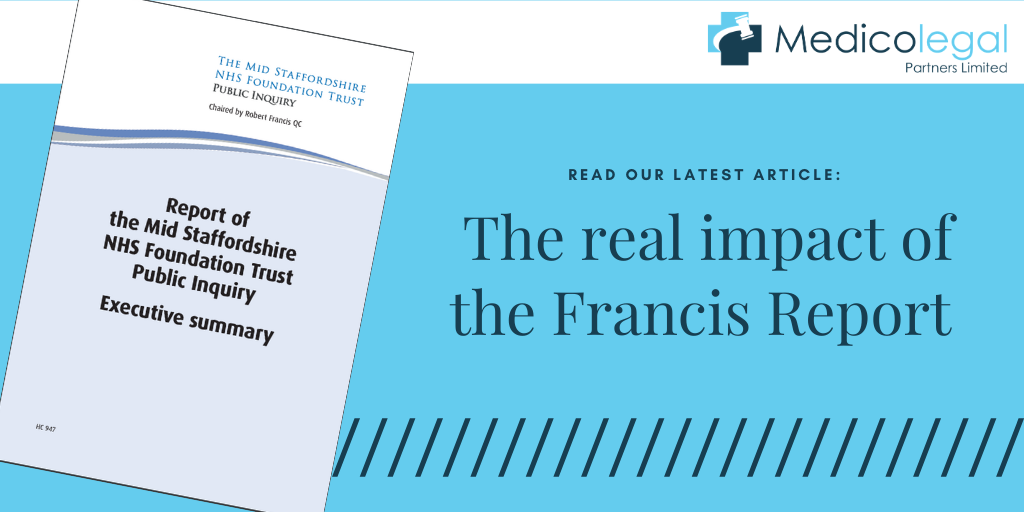
It is now over five years since the Francis Report was published and the duty of candour legislation was put into place in England. A similar statutory duty came into force in Scotland in 2018 and is currently being consulted on in Wales and Northern Ireland. The primary aim of these changes to the law was to alter the culture of the NHS, so that being open and honest when things go wrong would become a priority. However, it is unclear just how much difference the legislation has made in practice.
This is the fourth and final article in our series on The Francis Report and its impact. We have explored the background to the report and how health providers achieve the duty of candour and the barriers to its use. This article discusses The Francis Report’s impact on medical practice.
Regulators clearly have an important role to play in ensuring that candour is upheld. However, in the years immediately following the introduction of the legislation, it became clear that the Care Quality Commission was failing to do this adequately and by 2016, no providers had been held to account for breaches of their statutory duties. Since then, the situation has improved steadily, although there still appear to be some differences in approach between the regulatory bodies. Whilst providers should be held responsible for clear breaches in their duty, an overly punitive approach may actually discourage openness about mistakes. Willingness to admit to errors could be treated as a mitigating factor, which may have the effect of encouraging candour in others, although the amount of mitigation would depend very much on the underlying facts of each case.
In order to reflect the statutory duty of candour, regulators have updated their standards and the guidance available to registrants. This has had the effect of raising the profile of candour by supporting good practice, rather than by using the statutory duty as a punishment. While this has led to an increased awareness of the need for candour, there is still a lack of clarity and specificity which can make it hard for providers to know when they need to comply. However, one benefit of the statutory duty of candour, over the professional requirement which has always existed, is that the legislation defines how serious the harm has to be before action is taken.
Conversely, there is no allowance for the fact that reporting mistakes can be distressing for patients and their families. For instance, in end of life cases, where care has fallen short of the ideal standard but not shortened the patient’s life or caused their death, admitting that things have gone wrong to the patient’s family may actually cause further distress. Respecting what a patient wants to know could obviously be a limitation to candour but it is important to remember that patients have differing needs and the communication of information must be tailored to each individual scenario.
Some of the biggest changes following the Francis report and the introduction of the duty of candour legislation have been made in training and education. All of the regulators have made changes to ensure that candour is embedded in education and training. For example, in Northern Ireland, universities training MPharm pharmacists are required to teach the standards of candour expected of qualified professionals. In addition, compulsory professionalism sessions, which emphasise the importance of being open and honest, are delivered to all GP trainees and new appointments to specialty training. Furthermore, the General Medical Council, which covers the whole of the UK, has included the duty of candour in its requirements for professional values and behaviours, which must form a part of every postgraduate curriculum by the end of this year. These moves mean that students will have a good knowledge of the duty of candour from the very start of their careers, rather than when a mistake is made.
The introduction of the duty of candour legislation has had a noticeable effect on the role of primary care providers. GPs are now required to monitor the quality of all the care that a patient receives, so that their duty to a patient no longer ends once referral to a hospital has taken place. This means that, on behalf of patients receiving care from hospitals and other providers, GPs must take a more proactive role in monitoring the fitness to practice of healthcare professionals. However, it is unclear to what extent this may be possible. It is not realistic to expect GPs to review every single patient who is referred to hospital. In addition, the government’s introduction of the ‘any qualified provider’ (AQP) policy has meant that the range of organisations providing services for the NHS is expanding. Thus, it is difficult for GPs to remain fully aware of the standards of every single provider. It has therefore been argued that the AQP policy should be scrapped and the NHS made the preferred provider of referral services.
Perhaps the greatest difficulty for the NHS will be in implementing the duty of candour legislation against a backdrop of reorganisation and efficiency savings. It must also be recognised that such a fundamental change in culture will take time to achieve, particularly if it is not to become just another box-ticking exercise. While regulators clearly have an important role in encouraging candour, there is a limit to their influence as they form only one part of the healthcare system. Achieving the duty of candour in a way that is meaningful for patients will require regulators, professional bodies and education providers to work together.
Further reading:
Professional Standards Authority. Telling patients the truth when something goes wrong. Evaluating the progress of professional regulators in embedding professionals’ duty to be candid to patients. 2019; pp 13-42.
https://www.gponline.com/francis-report-means-gps/article/1170969
